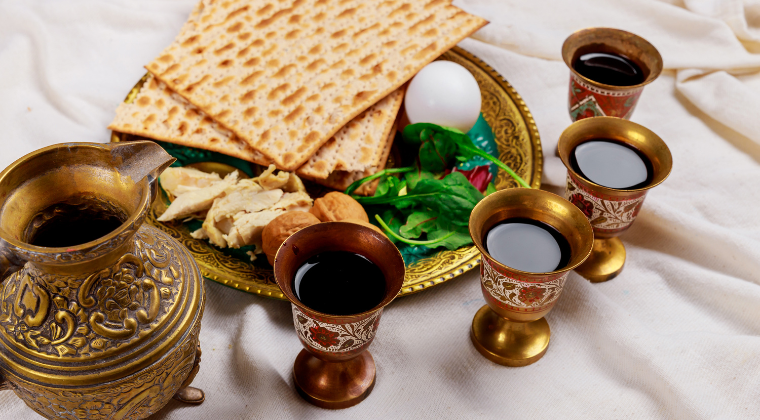Category: A Taste of Torah
A Taste of Torah – Parshas Shmini
Written by: Rabbi Mordechai Raizman
Using Everything for the Good
This week’s Torah portion starts off talking about the dedication of the Mishkan (Tabernacle). Aharon, the Kohen Gadol, was charged with the inaugural service which included bringing a calf as an offering to G-d. Rashi points out that this was not so easy for Aharon to do. A discussion took place between Aharon and Moshe about this service. Aharon appeared to be embarrassed and was not ready to fulfill the service for he was well aware of the fact that he participated in the sin of the Golden Calf and now felt uncomfortable bringing a calf to G-d. However, Moshe counters this reasoning and says to him, “Why are you embarrassed? This is exactly why you were chosen.” What was the idea that Moshe was conveying to his brother that made him worthy to be chosen for this task?
On a basic level most commentaries understand that Moshe was telling Aharon because you have a sense of embarrassment and you are approaching G-d with a feeling of remorse that is why you are chosen to bring this offering.
However, there is another layer here to be understood with a timeless message of hope for all. Human beings are frail, and we succumb to our evil inclination at times and make mistakes. G-d teaches us that we can always turn things around and learn from our mistakes. We should not give up hope that since we have sinned, we are unworthy to serve G-d. Instead, we should understand that the opposite is true. Yes, we may have sinned and made some mistakes, but we can learn from our sins and mistakes and use those experiences as a vehicle to get closer to G-d. Learning from our mistakes is an important part of growth in life.
Moshe is telling Aharon the reason you were chosen is because you sinned. You can now teach this lesson to everybody – that after one sins, don’t despair, but rather use what you have learned from that experience and turn it around to get closer to G-d. You, Aharon, must be the one to take a calf and offer it to G-d. In the past you used a calf for a sinful purpose. Now, you can use it to get closer to G-d.
One always has the opportunity to learn from every experience in life. Certainly, doing mitzvos and positive things are good for us. Let us also remember that even our negative experiences in life can be turned around and used for good as well.
A Taste Of Torah – Pesach
Written by: Rabbi Mordechai Raizman
Three Matzos
As we approach the Seder, there is a noticeable change in the start of the meal. Usually we set the table with two challos on Shabbos and Yom Tov, but on the night of Pesach we use three matzos. Some commentaries explain that each matzah represents one of our forefathers, Avrohom, Yitzchak and Yaakov, the founders of the Jewish nation. Since Pesach is the time when the Jewish people became a nation, it is befitting to keep our beginnings in mind, look back at our roots, our spiritual genes so to speak, as we start the Seder night.
One question arises if we explore this idea one step further. The middle matzah which represents Yitchak is the matzah that we break in two and save part of it for the Afikomen. What, if any, is the significance to breaking Yitzchak’s matzah?
When Avrohom was about to offer Yitzchak as a sacrifice to Hashem, Yitzchak never wavered in his belief. He was ready to give up his life for his beliefs. The breaking of “his” matzah symbolizes that mesrias nefesh (giving of one’s self) to do the will of G-d. Yitzchak’s actions instilled in Klal Yisroel (the Jewish people) the fortitude and strength to overcome the many challenges not only in connection with the Pesach story but for all successive generations.
Pesach, as we experience the Seder, is the opportune time for all of us to acknowledge how we have benefited from the previous generations’ mesrias nefesh. Their tremendous sacrifices continue to play a big part in instilling in us Torah values. The Seder provides the perfect setting for us to express our gratitude to our Rabbeim, Moros, parents, and grandparents for their constant mesrias nefesh to help us become steadfast in our commitment to be Torah Jews.
ATT, especially in this unprecedented time, calls for all to acknowledge and applaud the dedication of all of our schools, our principals, our teachers, our administrators, our staffs, and our parents for their tremendous efforts and tireless work to keep education alive in our community. May we all gather the strength and mesiras nefesh from our past generations and dedicate ourselves to make this a most joyful Yom Tov.
A Taste of Torah – Parshas Vayikra
Written by: Avrohom S. Moller
This week we begin Sefer VaYikrah also known as תורת כהנים, the Laws of the Priesthood. It is because VaYikrah, Leviticus, deals with the laws of sacrifices, ritual purity and the special requirements of the priestly caste. It underscores that there are different strata and status amongst the Jewish people, where the Kohanim are “holier” and more chosen than the Leviim and Yisraelim. Sefer VaYikrah comes after Sefer Shmos, the Book of Redemption, where the Jewish people develop from a family to a mighty nation which receives the Torah, and everyone is a member of the “kingdom of priests.” Together they build the Mishkan, an earthly “abode” for Hashem to “dwell” in their midst. It seems very egalitarian and accessible to every Jew from every background.
The juxtaposition of Sefer Shmos and VaYikrah seems to pose a very fundamental question. If we have a very basic belief that all men stand equal before Hashem and that free will is in the words of the Rambam “a basic tenant and a major pillar in Torah and mitzvah,” then why would Hashem create a hegemony of kohanim who inherit their status and seem to be privileged from birth with their status?
Perhaps the answer is that there are two pathways which one must utilize to achieve closeness to Hashem and success as a Jew. It can be imposed externally by divine decree that a person must follow a prescribed path. His free will is expressed in his acceptance of these rules and restrictions, and when one views these responsibilities as an opportunity to grow, it will bring him closer to Hashem. On the other hand, one has to pursue a course of self-expression and individuality to become closer to Hashem. Autonomy is a pillar of Judaism together with humility and submission to Hashem’s will. Every Jew is a priest, some are given more responsibilities, but all Jews must create their personal connection with Hashem as well. The Gemara actually says that an illegitimate scholar is greater than an ignorant high priest.
We are preparing for Pesach, a time where we relive the אהבת כלולותיך, the sweet love of our union with Hashem some three millennia ago. It is time to reflect on how we relate to Hashem in our special and individual way and also how we conform to his dictates expressed in the Torah.
A Taste of Torah – Parshas Vaera
Written by: Rabbi Mordechai Raizman
Be All That You Can Be
In the next few parshiyos two main characters are repeatedly mentioned, Moshe and Aaron. Rashi questions the way the Torah presents each of them. Sometimes, the text has Moshe’s name preceding Aaron’s, and other times Aaron’s name comes first. Rashi recognizes that the person who is mentioned first is the primary person for that action or event and more honor is being attached to that individual. He goes on to explain that since Moshe and Aaron take turns with being mentioned first, this teaches us that the two of them are equal in stature. However, when one carefully examines the roles that these two individuals played, it is clear that Moshe is the main leader appointed by G-d to take the Jews out of Egypt and was definitely on a higher level than Aaron. Therefore, what does it mean that they are equal?
Rav Moshe Feinstein, zt”l, explains it is true Moshe was on a greater spiritual level than Aaron. For example, Moshe spoke with G-d directly, a spiritual level that no other human being has ever reached. However, Rashi’s interpretation of the significance of the presentation of the order of the name does not contradict this, but instead, explains a fundamental principle in understanding the greatness of every individual. His point is that each individual is given his/her own unique capabilities that he/she has to bring to use in this world. It is not about how we measure up to others. Aaron may not have been on the same spiritual level as Moshe, but he lived up to his capabilities and what G-d asked of him to do in this world. Therefore, they are equally great in reaching their own potential.
This a great lesson in life for parents and educators. We have to look at every child and student with their individual strengths and what they uniquely bring to the table. As we recognize that individuality, we will truly see the greatness in every person.
A Taste of Torah – Parshas Shemos
Written by: Rabbi Avrohom S.Moller
“A man went from the house of Levi and married a daughter of Levi.” With these words, the Torah tells us the background of Moshe Rabeinu’s birth. It seems that the Torah deliberately does not identify Moshe’s parentage and instead describes them as members of the tribe of Levi. This is unusual since there is no secret that Amram and Yocheved were his parents. They are named in the beginning of next week’s parsha as his parents, and the Torah devotes several pesukim to establish Moshe’s parentage.
Rav Shamshon R. Hirsch suggests that the Torah is underscoring the fact that Moshe parents were Levites because the tribe of Levi had been castigated in last week’s parsha for their fierceness and uncontrolled anger. Yaakov Avinu criticized Levi for the destruction of Shechem, and he attributed his action to unbridled anger.
Although anger is a very dangerous emotion, it does have its useful side. For example, when Pharaoh decreed that all Jewish males should be drowned, Amram, a trendsetting leader, separated from his wife. He felt that there was no future for newborn children. His daughter Miriam rebuked him and said that he had no right to make such a decision about the Jewish people’s future. She succeeded in arousing a righteous indignation in her father. Amram realized that his action was a concession to Pharaoh, and instead, he needed to fight back by remarrying Yocheved and having more children and so Moshe the Redeemer was born. In greatest of ironies, Hashem had him raised right under Pharaoh’s nose. It all began with a well-placed anger against the tyranny and cruelty of Egypt which created the will to fight for a future.
There are two lessons here. Firstly, a character fault can be channeled and turned into the very thing that brings salvation. Secondly, Hashem and his Torah are very fair. By the end of last week’s parsha, Levi is chastised and seems to be left with no blessing and somewhat disenfranchised. However, his family uses the very trait which brought him this criticism, not only to redeem themselves, but to become leaders who stand up to wrongdoing in the very finest way.
A Taste of Torah – Parshas Vayechi
Long Lasting Effects
In this week’s Torah portion, Vayechi, Yaakov tells Yosef that your sons that were born before I came down to Egypt, Ephraim and Menashe, are mine. Rashi understands the statement to mean that Yaakov has a greater connection with the sons born before he came down to Egypt than to Yosef’s future children that would be born while he would reside in Egypt. Rashi notes that this statement also has a practical application. Only these two sons born before Yaakov’s arrival are to be counted as part of the twelve tribes and receive an inheritance in the land of Israel. A question then arises. Wouldn’t it be natural to assume that the sons born while Yaakov is living in Egypt would have a greater connection with Yaakov being raised under his guidance as opposed to the sons who were already grown when their grandfather arrived?
Rabbi Moshe Feinstein Zatzal says this passuk illustrates a great lesson about chinuch – educating our children. Yaakov’s message to Yosef was simply defining successful parenting. He is saying to Yosef that the chinuch I, Yaakov, gave you enabled you to raise your children true to the values of Torah even in a foreign land without my presence.
Educating one’s children to learn the values that are dear to us is a daunting task, and its true measure of success is recognized even more so when one’s children leave home and take those lessons with them. Therefore, a parent does not have to be close by watching every move his/her child makes. Parents need to give their children the tools, life lessons, and values to trust to make the right choices wherever they may be.
May we all see to follow in the footsteps of our forefather Yaakov and instill in our children a deep appreciation of who we are and for what we live.
A Taste of Torah – Parshas Re’eh
Written by: Rabbi Avrohom S. Moller
It Isn’t Easy to Commit
When the Torah discusses the mitzvah of tzedakah-charity, the possuk says, “כי בגלל הדבר הזה” – as a result of this matter (your generosity) Hashem will bless you in all of your endeavors. Rashi quoting the Sifri notes the choice of the word “davar,” which literally means thing or matter, can also mean speech or word. Rashi therefore explains that one is rewarded not only for the charity he does but also for the words he said when he made the commitment. What is the importance of the words; don’t the actions speak much louder than the words?
We can understand this in one of three ways. Firstly, the Torah is teaching us the importance of inspiring others when we do a mitzvah. The Mishna in Avos (5:13) says that one who desires to give and that others should give as well is a chasid, a pious person. Our sages instruct us to publicize those who do a mitzvah in order to inspire others to follow suit. (See Yoma 31a.) This does not contradict the principle of being modest and humble in our service of Hashem if our public participation in a mitzvah is predicated on the intent to get others to join and not for self- aggrandizement.
A second explanation is that making a commitment raises the level of difficulty in doing the mitzvah. Once a pledge is made, we’ve obligated ourselves to do something and that is uncomfortable. Our sages teach us that one who does things because they are obligated gets more reward than one who does things voluntarily beyond what is required of them. This may seem counterintuitive, but it is an important insight into our humanity. We like to be heroes; we don’t like to pay bills. Once we make a commitment, it is harder to stick to it and fulfill what we said.
A third explanation is that when we make a public commitment, we are avoiding the pitfall of cynicism. Often, when people are asked to participate in a worthy cause, they have many reasons to say no. It could be lack of trust of the leadership, non-belief that effort will be successful, feeling that we have a better plan, etc. We are wonderful “armchair quarterbacks” when it comes to communal issues. When we commit to a communal cause, we are avoiding that bad behavior and resisting the cynical response that robs us of communal initiative.
All three of these lessons are helpful when we speak to our children about getting involved. We should do mitzvos with the hope that others will join us. We should make commitments because we become obligated by them, and we should value being part of worthwhile communal endeavors.
A Taste of Torah – Parshas Eikev
Written by: Rabbi Mordechai Raizman
Leadership at Its Best
In this week’s Torah portion Ekev, G-d tells Moshe to relay the following message to the Jewish people. “What does G-d ask of you but to fear Him?” The Talmud analyzes this statement and makes the following observation. In using the term what, it implies that the matter is quite simple. With that, the Talmud wonders is fear of G-d a small and trivial thing? To truly have an awe of G-d in one’s everyday life is the work of a lifetime. Therefore, how can it be phrased in such a manner that makes it seem like it is an easy thing to attain?
The Talmud goes on to answer that yes, for Moshe, to have an awe of G-d is a small thing. However, we are now left wondering how this answers the question asked above. G-d commanded Moshe to relay this message to the Jewish people. This wasn’t a command to Moshe alone. Yes, it may be easy for him, but it is certainly not easy for the rest of Bnei Yisroel.
There is a great lesson in leadership to be learned from this. A leader leads by example. If a leader exemplifies and demonstrates a characteristic trait to the masses and makes it look easily attainable, the masses will follow his lead. It is true, on our own, to attain the level of fear and awe of G-d may be an arduous task. However, now, that we, the Jewish people, experienced Moshe’s leadership, we realize that to relate to G-d, fear G-d and to live an inspired life of observing Torah and mitzvos is attainable.
Having a role model from which to learn is a great lesson for all of us as parents, educators, lay leaders, etc. We all need to have special individuals in our lives that enable us to strive for more than we could have imagined in our own spiritual growth. We must then, in turn, try to become role models for the next generation.




